COVID booster scam? Here’s how to protect yourself
While steps are being taken to reduce the number of incidents, fraudsters are coming up with new schemes to loot people.
- Fraudsters posing as health professionals are attempting to deceive consumers and steal their bank account information in the newest COVID booster shot scam.
- The fraudsters then ask if the person has taken the second dose, as well as their address, phone number, and other personal information.
- Scammers attempt to dupe consumers into providing the OTP in exchange for a quick money transfer.
Trending Photos
)
New Delhi: Individual lives have been severely impacted by the COVID-19 epidemic. While people struggle to recover from the unexpected disaster, fraudsters take full advantage of the situation.
With the rapid spread of the Omicron variation leading to an increase in COVID cases, the Indian government began distributing preventive doses to residents over the age of 60. While steps are being taken to reduce the number of incidents, fraudsters are coming up with new schemes. Fraudsters posing as health professionals are attempting to deceive consumers and steal their bank account information in the newest COVID booster shot scam. Here's how the crooks are attempting to deceive the public:
As previously stated, criminals posing as health experts call people, primarily the elderly, claiming that the precautionary booster is only available to senior folks at this time. The fraudsters then ask if the person has taken the second dose, as well as their address, phone number, and other personal information. Surprisingly, in some circumstances, the caller already has all of the relevant information, including the vaccination date.
After gathering all of the information, the con artists contact back to see if anyone is interested in obtaining a booster shot and if they want a spot. They provided an OTP to the mobile number once the immunisation date and time were confirmed. Scammers may also request that you download a certain software, such as AnyDesk, to aid with the booking process. The OTP is nothing more than a key in a phishing scam, the last step in validating a money transfer from the victim's bank account. All funds from your bank account are transferred once you give them with the OTP.
According to research, the alleged scam is especially common in rural areas, where the elderly have no understanding of how online banking, UPI, or smartphone apps for vaccine slot booking function. Scammers attempt to dupe consumers into providing the OTP in exchange for a quick money transfer. Here's what you can do to protect yourself against such scams:
Spam/fake calls Staying cautious can help you avoid fraud, whether it's for COVID slot booking or internet banking. The most crucial point to remember is that the government does not offer the option of booking immunisation appointments over the phone. The only option to reserve a vaccine time is to visit the Cowin portal or download the Arogya Setu app. Even if you are unable to arrange an appointment online, you can still obtain the vaccine by going to any immunisation centre and registering. When obtaining an OTP, it is recommended that you read the message carefully before proceeding. Second, call filter apps can be downloaded that indicate whether a call is spam.
Stay informed on all the latest news, real-time breaking news updates, and follow all the important headlines in india news and world News on Zee News.
Live Tv







)
)
)
)
)
)
)
)
)
)
